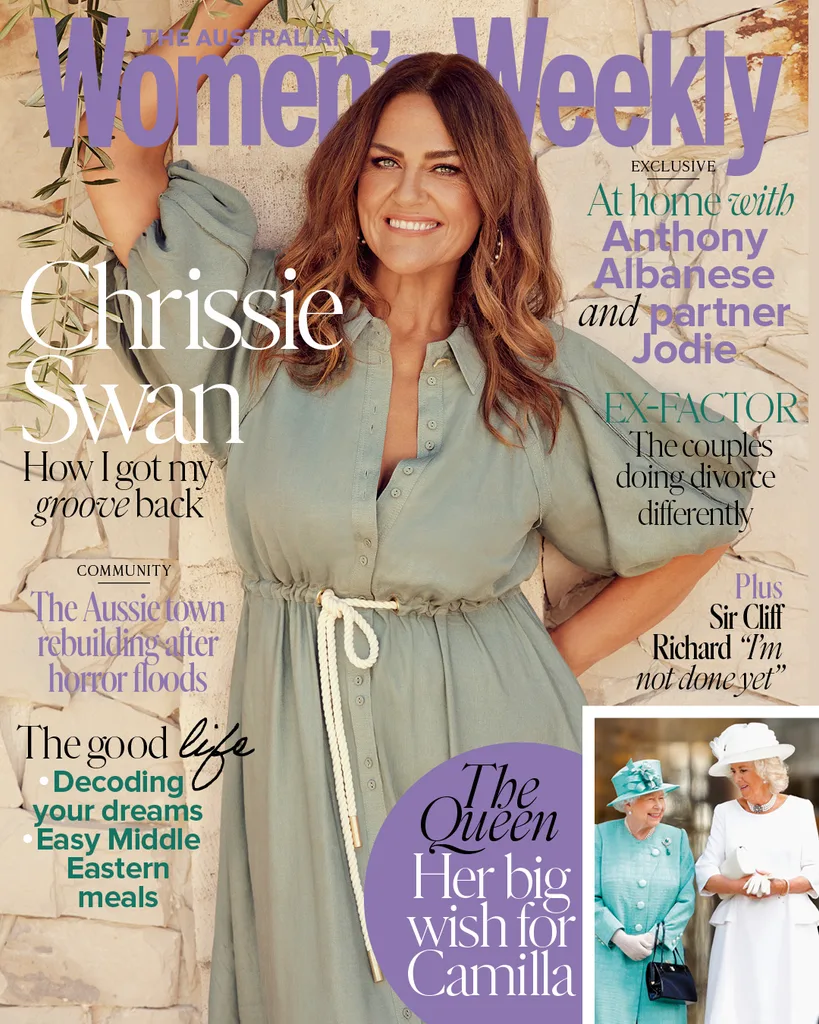It was one of the nurses who reminded me I should speak to my children. To be fair, I had a bit on my mind – I’d been in hospital for over two months. A streptococcal A infection had led to sepsis and, to survive, my hands and feet had just been amputated. I was bloody lucky – and grateful – to be alive, but I hadn’t expected to become disabled at 39.
My husband, Rod, our three girls and I lived in Kilmore, a small town in regional Victoria, where I had a busy life as a stay-at-home mum. I volunteered at the kids’ primary school and kinder, was on the local playground committee and headed the school’s Parents & Friends committee. I did aerobics twice a week and played netball on Wednesday nights. My life looked just how I’d imagined it would.
But now here I was, flat on my back, bandaged from the shoulders down, with empty bed sheets where my feet should have been. The morning I was taken away in an ambulance, Samantha, our eldest daughter, had huddled in bed with her two little sisters, keeping them calm by reading stories. We should have been celebrating her ninth birthday that day – instead, Mummy went to hospital.
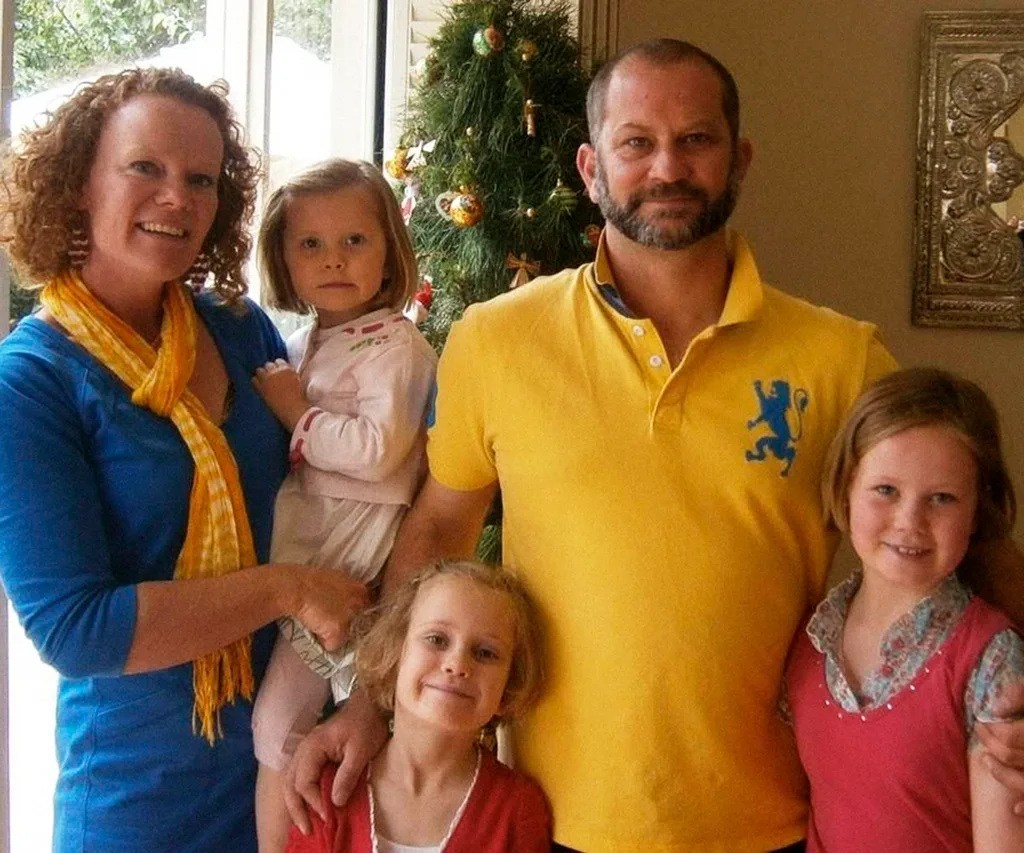
Mandy McCracken with husband Rob and their beautiful children.
(Image: Supplied and used with permission)“I can help you,” the nurse suggested. “I’ll hold the phone to your ear and you could say goodnight to them. It will be easy.”
The next evening, the phone rang loudly on my bedside table and the nurse dashed into my room to answer it. She lifted the receiver just moments too late.
“Argh, missed it, sorry,” she said. The scene repeated several times until, hot and sweaty, she finally held the phone to my ear.
“Hi Mummy,” a tiny voice squeaked on the other end.
“Hello, gorgeous!” I beamed and instantly began to relax. “It’s so good to hear your voice. How was school today?”
“Good.”
“What did you learn about in class?”
“Not much.”
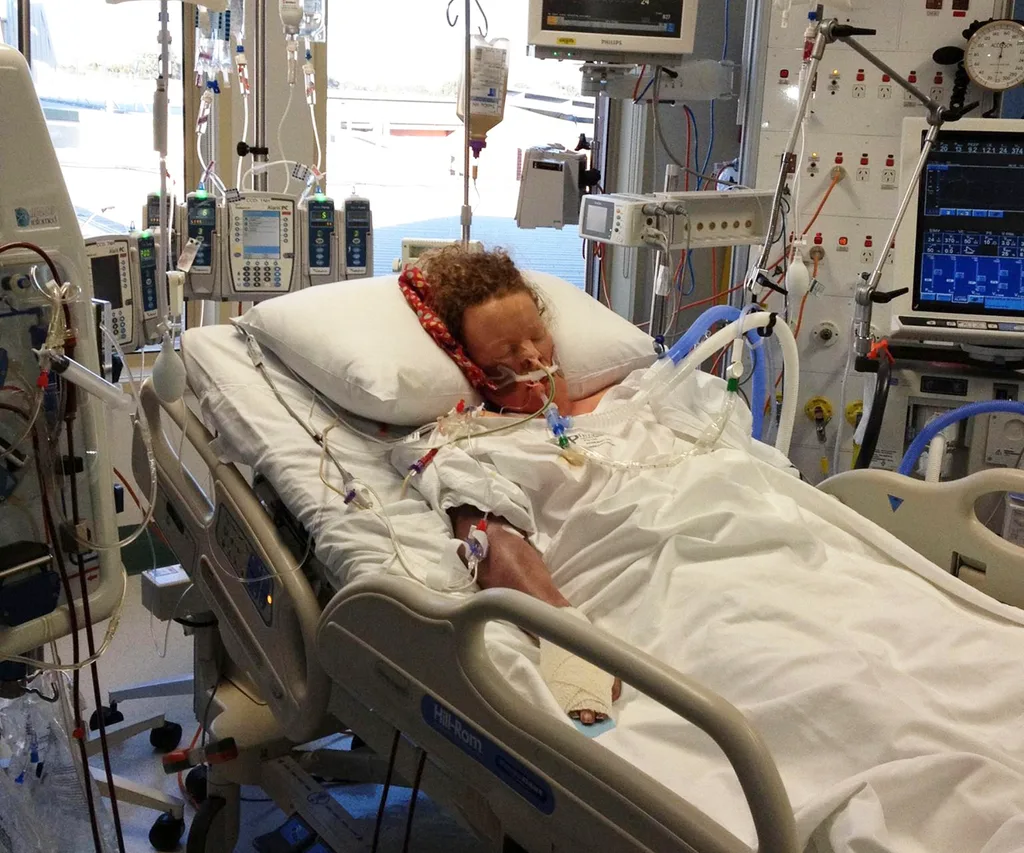
Mandy had to have her hands and feet amputated after a severe case of sepsis.
(Image: Supplied and used with permission)It was my middle daughter, Isobel. She was only seven and not the chattiest kid on the phone. The young nurse silently shifted on her feet. The hospital ward was completely full and staff were always under the pump. I spoke briefly to Samantha and Tess before finally it was Rod’s turn.
“Hi, babe. The girls are so excited to speak to you.”
“They don’t have much to talk about,” I said sadly. “I’ve really let them down, haven’t I?”
“Don’t ever think that,” he replied. “You know they love you and this is not your fault. Give it some time … it will get easier.”
The following weekend Rod brought the girls in to visit me. Although he had explained to them everything that had happened, we knew their first visit would be difficult. The curtain parted and three little faces slowly appeared.
“Hi, girls!” It was so good to see them – but they all looked completely terrified. They were dressed in their finest, their hair carefully brushed and plaited. Samantha was the only one to move forward herself to stand by my bed. “Hi.”
Spying a chair in the corner, Isobel and Tess quickly retreated there. For five minutes or so we talked lightly about school and life at home – but I knew they were really waiting to see what had happened to their mum.
“Okay, come over here and have a look at my arms.”
Tess jumped up from the chair and stood rigid by my bed. Holding up a tiny, pointed finger she gently pressed my bandages.
“Don’t hurt her,” said Samantha firmly, tugging Tess’s hand away.
“It’s okay, Sammy, it doesn’t hurt.” In a calm voice, I explained what had happened. How the doctors had given me medicine to help me go to sleep and how, with a special knife, they had cut off my hands and feet. With Issy listening silently from the chair in the corner, Samantha and Tess asked all sorts of questions as they walked around my bed, lifting the sheets to look at my legs. After 10 minutes or so they’d seen enough; their little faces relaxed, content that the situation was under control.
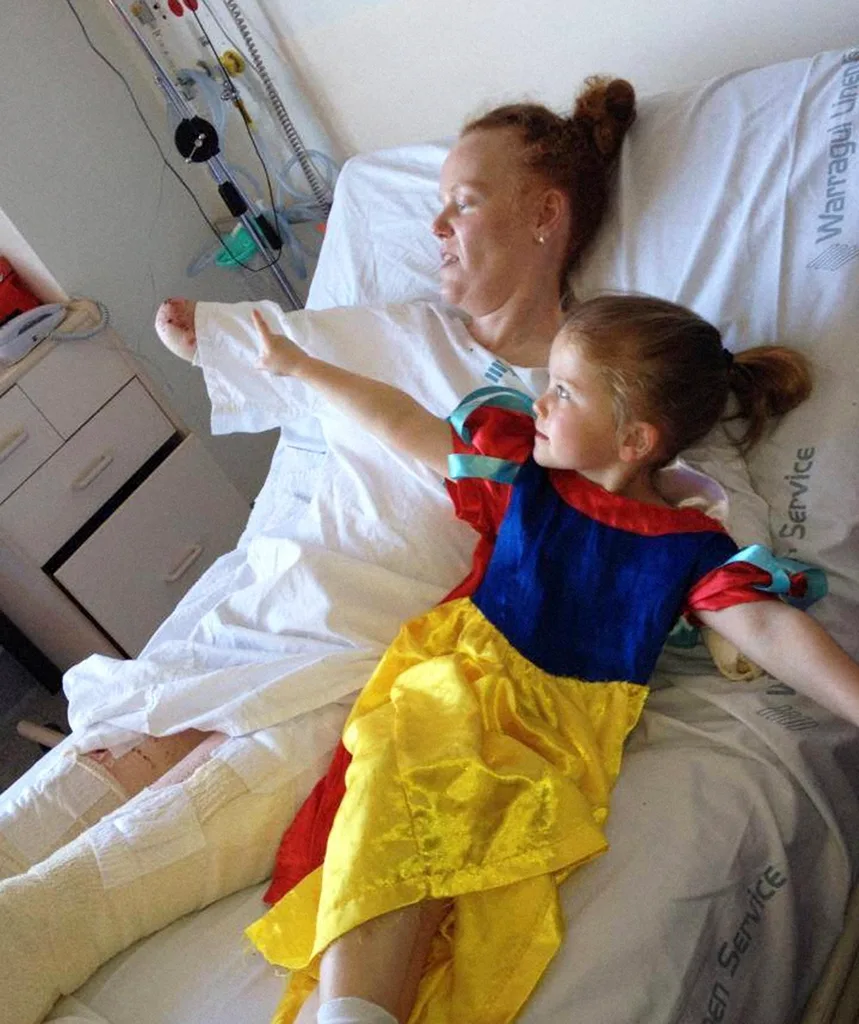
Showing her children the results of her amputations was a difficult moment for Mandy.
(Image: Supplied and used with permission)“Show Mummy what you’ve brought for her.” Rod held up a big bag and Samantha and Tess began unpacking their goodies. Isobel decided it was safe to join in and together the four of them filled my hospital room with handmade paintings and cards. Now my room was ablaze with colour and over the following months the girls added to it every week.
I got used to my hospital bed being covered in tiny shoes and socks from Tess crawling in next to me. Being incredibly careful not to bump Mummy’s sore arms or legs, Tess and Samantha often relaxed on the bed. Isobel was the last to climb up. She always began her visits sitting in the corner of the room. We didn’t want to rush her: she was comfortable there. Finally, one day while the others were hanging paintings, she came and stood by my bed and gently asked the question that had been reverberating in her head for weeks.
“Mummy. Are you going to be okay?”
“Yes, I am.”
She looked at my bandages and, like her little sister before her, gently held out her tiny fingers and touched them. She stayed there for a quiet moment before slowly climbing up onto the end of my bed and dropping her sandals to the floor below.
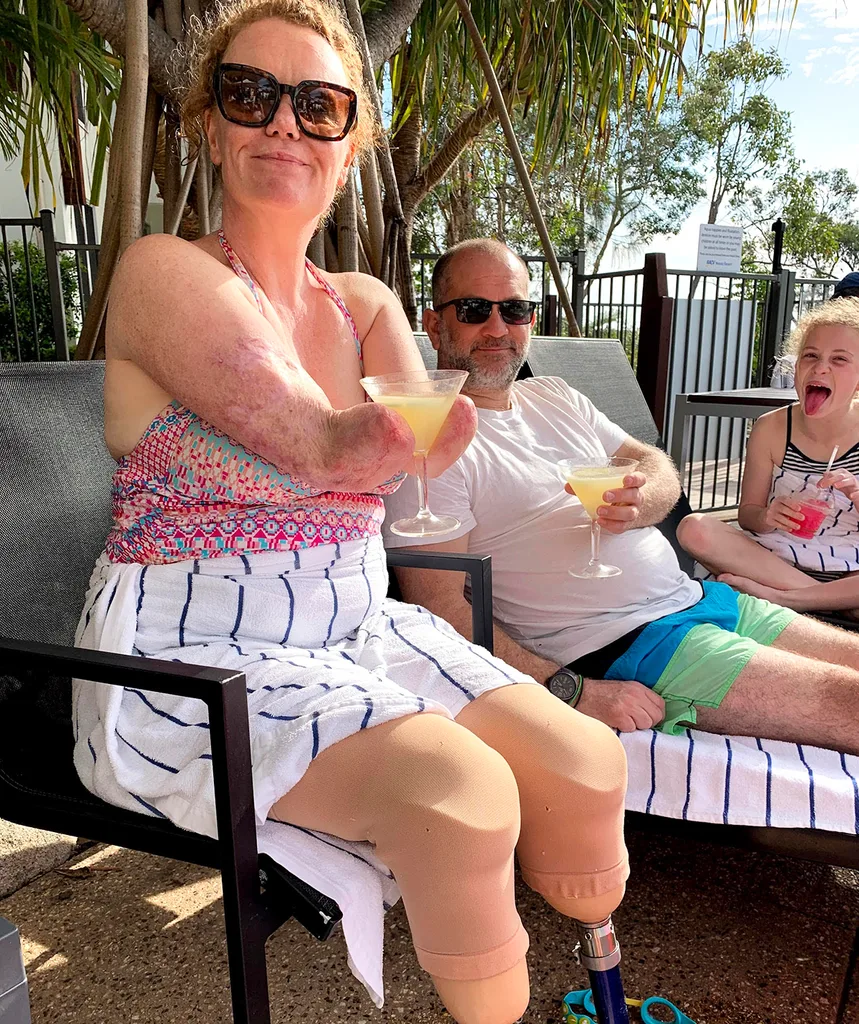
Despite the setbacks, Mandy and her family kept their chins up.
(Image: Supplied and used with permission)Back home, word had spread around the whole town. Until I got sick, Rod had been a teacher at our local college. Teaching was his life. Rod grieved the loss of his career but committed to his new role as stay-at-home dad 100 per cent. He cooked, cleaned, ironed uniforms, tied ponytails and explained what periods were. He paid the bills, shopped for groceries and helped with homework.
When I returned home, our roles shifted in another way. Now the kids helped me get dressed, pulled up my undies after I went to the toilet and put my hair in ponytails. In the months that followed, the three girls became very comfortable taking my prosthetic hands and legs on or off as required.
But no one else in town had had a chance to get used to me. When I arrived back at the school carpark for the first time, I was met with many shocked faces.
“Your mum’s a pirate! Your mum’s a robot!” Isobel cried furiously one night as she repeated what the kids at school had been saying. After a week of tears, it was obvious something needed to change. I rang Issy’s teacher and arranged for all the Grade One kids to be brought together for show-and-tell. Issy stood next to my wheelchair at the front of the room. Once they’d quietened down, I got straight to the point.
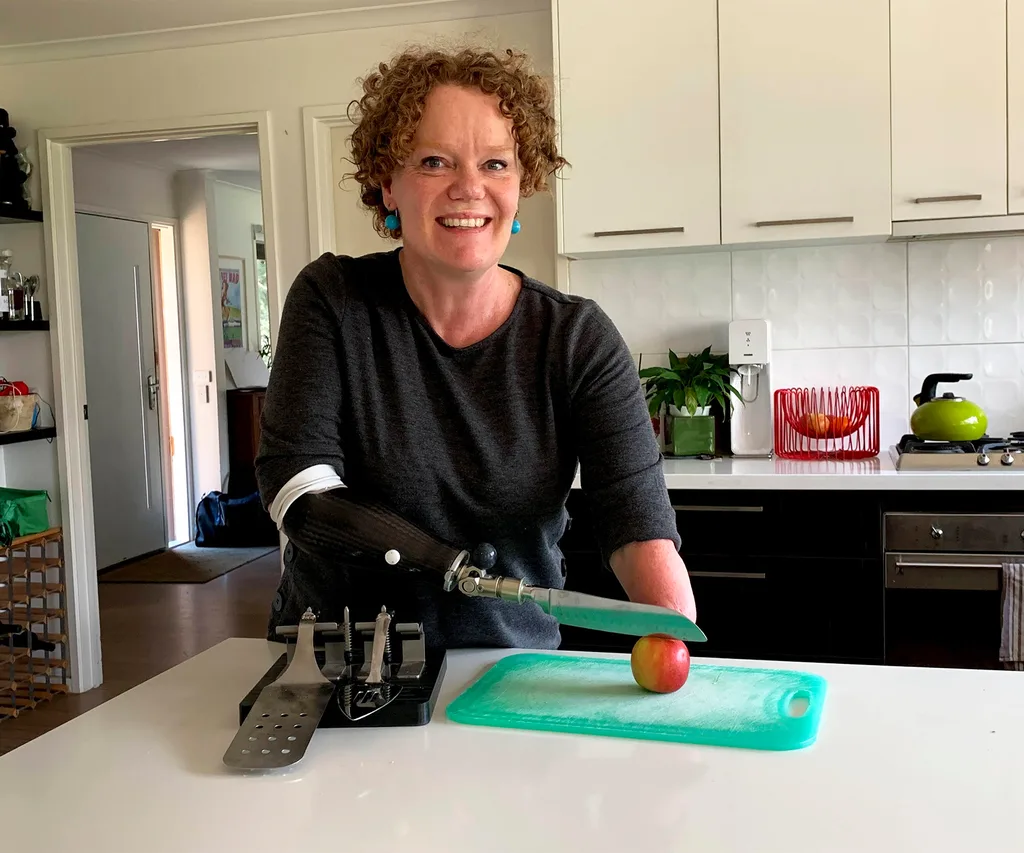
Mandy has found ways to adapt and continue being the best mum she can be.
(Image: Supplied and used with permission)“Back in August I got really sick with a nasty bug that got into my blood. It’s nothing to worry about, you can’t catch it, but the only way I could stay alive was to have my hands and feet amputated.” Wide eyes watched as I raised my new plastic arm. “Go on, honey, pull it off.”
Isobel grabbed my prosthetic hand and with a little twist, off it came. “Wow!” The kids were amazed. They’d never seen anything like it.
“Issy, why don’t you explain to everyone how my hands work?” Issy did, and then she passed the hand around the room. Next were my legs. Again, she pulled my prosthetics off and showed everyone how they worked. Hands shot up as tiny kids burst with questions.
“Did it hurt?”
“How big was the knife?”
“Did they use a chainsaw?”
“Can you feel through your plastic fingers?”
“Are you a pirate?”
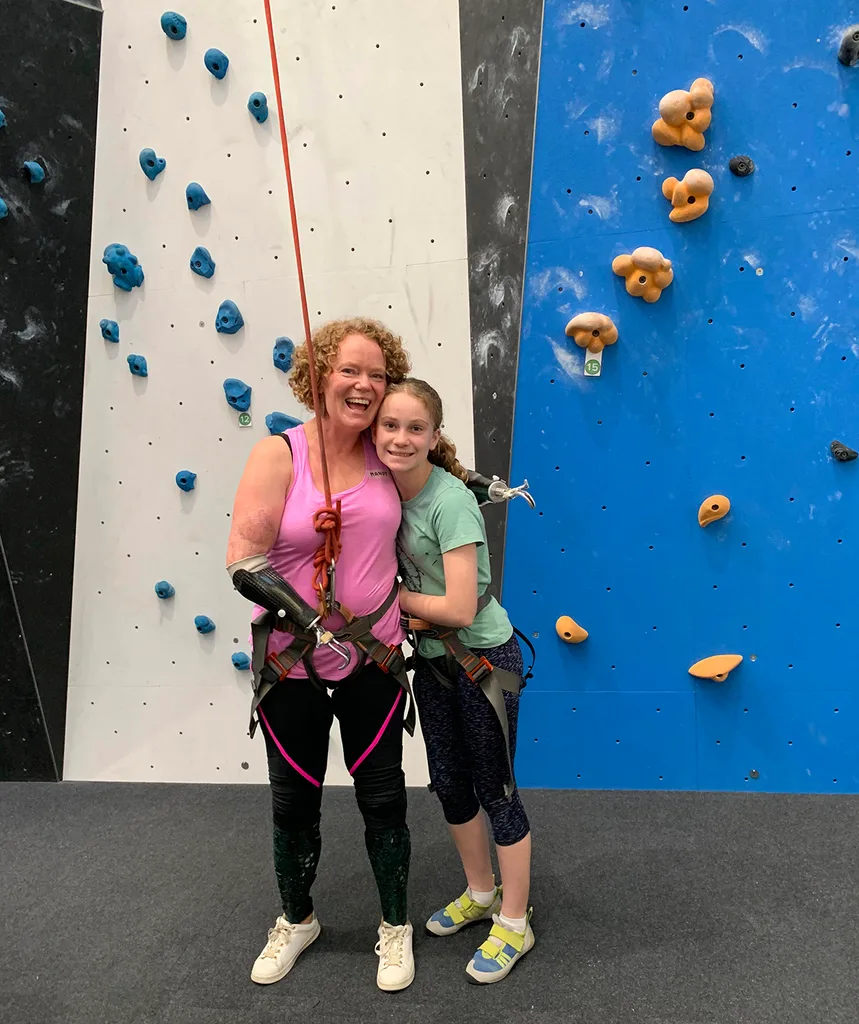
Now Mandy lives a full and happy life with her family.
(Image: Supplied and used with permission)For the next 20 minutes, nothing was out of bounds. Then a little boy stood up. “I’ve got a scar too!” Lifting up his school shirt, he pointed to the long red line running through his belly button. “The doctors put me to sleep too.”
That afternoon, as Rod pushed my wheelchair across the schoolyard, instead of pointing and hiding behind their mums, kids rushed over to me and Isobel to say hello. And they ran off eager to tell their mothers about my cool pirate legs and robot arms.
Now, years later, I am just a regular parent in the schoolyard. I don’t get looks as I arrive. I no longer have conversations about how my hands work and my girls don’t have to retell the story of what happened to me. I am just Mandy, another mum in the playground.
Nowadays, Mandy gives talks at schools and helps other quad amputees adjust to their new lives. She also works at the ABC, sharing stories about people with disabilities. Mandy’s story is an extract from We’ve Got This, edited by Eliza Hull, published by Black Inc.
You can read this story and many others in the March issue of The Australian Women’s Weekly – on sale now.
